- News
- Reviews
- Bikes
- Components
- Bar tape & grips
- Bottom brackets
- Brake & gear cables
- Brake & STI levers
- Brake pads & spares
- Brakes
- Cassettes & freewheels
- Chains
- Chainsets & chainrings
- Derailleurs - front
- Derailleurs - rear
- Forks
- Gear levers & shifters
- Groupsets
- Handlebars & extensions
- Headsets
- Hubs
- Inner tubes
- Pedals
- Quick releases & skewers
- Saddles
- Seatposts
- Stems
- Wheels
- Tyres
- Tubeless valves
- Accessories
- Accessories - misc
- Computer mounts
- Bags
- Bar ends
- Bike bags & cases
- Bottle cages
- Bottles
- Cameras
- Car racks
- Child seats
- Computers
- Glasses
- GPS units
- Helmets
- Lights - front
- Lights - rear
- Lights - sets
- Locks
- Mirrors
- Mudguards
- Racks
- Pumps & CO2 inflators
- Puncture kits
- Reflectives
- Smart watches
- Stands and racks
- Trailers
- Clothing
- Health, fitness and nutrition
- Tools and workshop
- Miscellaneous
- Buyers Guides
- Features
- Forum
- Recommends
- Podcast
news
EF boss Jonathan Vaughters slams “fat cats who have never raced so much as a child’s tricycle” after Tour de France director blames crashes on “riders going too fast”; Premier blasts bike lanes for congestion caused by Santa parade + more on the live blog
SUMMARY
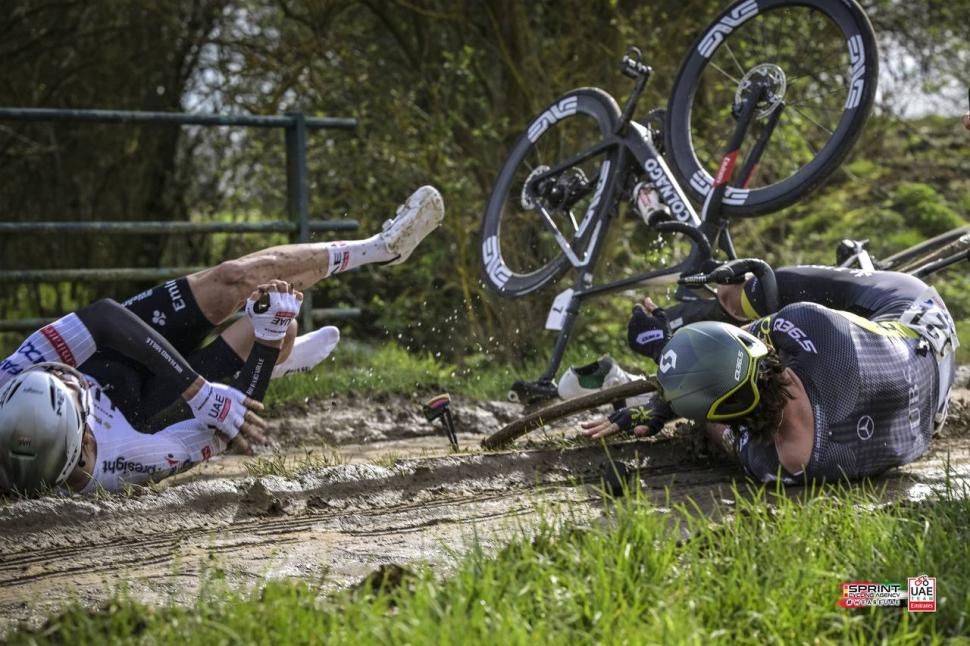 Álvaro Hodeg and Xabier Azparren crash on muddy cobbles at GP de Denain (SprintCyclingAgency)
Álvaro Hodeg and Xabier Azparren crash on muddy cobbles at GP de Denain (SprintCyclingAgency)26 November 2024, 09:08
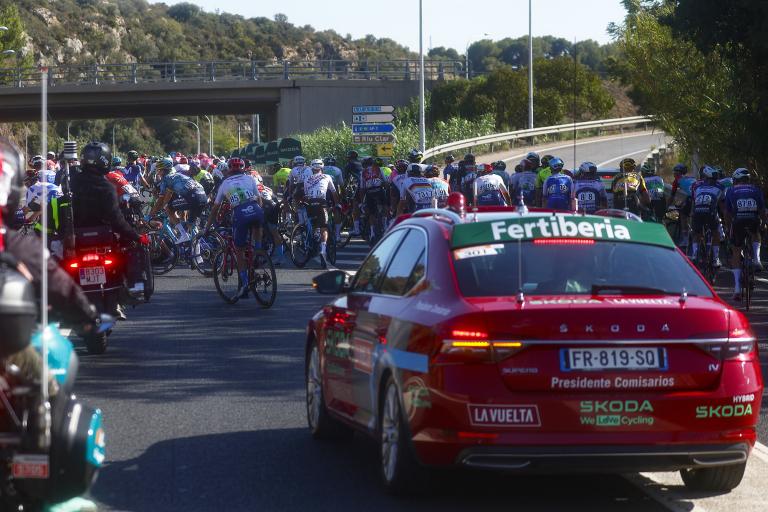
EF boss Jonathan Vaughters slams “fat cats who have never raced so much as a child’s tricycle” after Tour de France director blames crashes on “riders going too fast”
At the end of a season marred by that horrendous high-speed crash at the Itzulia Basque Country and the tragic death of Swiss junior rider Muriel Furrer at the world championships, it is no surprise that safety remains high on the list of priorities for cycling’s powers that be as we head into 2025.
However, Tour de France director Christian Prudhomme’s recent claim that crashes such as the one in the Basque Country in April are caused by riders “going too fast” has been scathingly condemned by EF Education-EasyPost boss Jonathan Vaughters, who branded the comments “absolutely infuriating”, dismissing Prudhomme as one of the sport’s “fat cats who have never raced so much as a child’s tricycle”.
(A.S.O./Etienne Coudret)
Last week in Italy, at the annual general assembly of the association of race organisers (AIOCC), Prudhomme blamed the shocking Itzulia crash – which took place on a steep, technical descent and brought down Jonas Vingegaard, Remco Evenepoel, Primož Roglič, Jay Vine, and Steff Cras, scuppering Vingegaard’s preparations for his Tour defence in July – on the high speeds employed by the modern peloton.
“Beyond the behaviour of the athletes and the work of the organisers, it is absolutely necessary to reduce speed by appropriate measures: the riders are going too fast,” the Tour de France’s general director told the assembly.
“The faster they go, the greater the risk and the more they endanger themselves and others.
“We already said it here last year: our car and motorbike drivers no longer have a safety margin! Imagine the consequences if one of our drivers, subjected to too much pressure, lost control on a mountain descent or when racing through a built-up area.”
While Prudhomme was quick to pin the blame on the riders taking more risks and pushing the envelope when it comes to speed, it must be noted that the scene of the horror crash – the descent of the Olaeta climb, with around 30km to go on stage four of this year’s race – was flagged by Vingegaard as unsafe six months before the Tour of the Basque Country.
According to the Safe Cycling group, they attempted to contact the race organisers about Vingegaard’s concerns, but “never got an answer”.
So it’s hardly surprising that EF chief Vaughters – never one to shy away from confrontation with cycling’s top brass – wasn’t overly impressed with Prudhomme’s recent assessment.
After initially responding to the Tour director’s statement with the sarcastic hashtag #MakeRacingSlowAgain, Vaughters wrote on Twitter: “It is absolutely infuriating to me how these fat cats, who have never raced so much as a child’s tricycle, turning tens of millions in profit off the backs of others, squarely throw the blame of safety issues in cycling on the riders.”
The former US Postal rider continued: “They are highly competitive people. They are hard wired to the bone to take life threatening risks. Similar to F1 drivers.
“And like in F1, the answer is to create a safer environment around them. Because they will always push the envelope as far as it goes.”
(Zac Williams/SWpix.com)
Shortly after Prudhomme’s rather shortsighted intervention at the race organisers assembly, UCI President David Lappartient also turned to the much vexed subject of rider earpieces, arguing that there are fewer crashes at world championships, where earpieces are not allowed.
Lappartient told the assembly that while teams argue in favour of earpieces by citing safety concerns, they also use them to constantly tell their riders to move to the front of the peloton, causing chaos and crashes in the bunch.
“I’ve also had riders write to me who don’t necessarily want me to publish their names – the majority will want to keep the earpieces – but there are still a lot of riders who consider that it’s an element that contributes to a certain amount of stress in the peloton,” the UCI president said.
“I think it’s a bit of a shame that some people want to draw a conclusion from a dramatic fall such as that of Muriel Furrer, which is under investigation by the police.”
26 November 2024, 10:02

“Gotta cede the province to the car just in case Toronto decides to have a Santa Claus Parade every day of the year”: Premier defends anti-cycle lane agenda after NHL players forced to walk to match due to congestion… caused by huge annual Santa parade
I regret to inform everyone, but Doug Ford’s been at it again.
Over the past few months, the Ontario premier has engaged in a relentless anti-cycle lane crusade, pledging to limit the construction of bike lanes in Ontario and rip out some recently installed ones, claiming that motorists should have priority on busy city streets – and that cyclists should simply be shunted onto “secondary roads”.
Ford’s proposals – which have been criticised by both cyclists and local officials as an act of government overreach – would block the construction of new cycling infrastructure if its results in the loss of lanes previously reserved for cars, buses, and lorries, while ripping out three of Toronto’s recently installed bike lanes.
Last Thursday, despite vehement opposition from Toronto councillors, the businessman and leader of Canada’s Progressive Conservative Party passed his controversial cycle lane bill, which will also create legal protections for the province if cyclists are hurt or killed on streets where the current infrastructure will be removed, a decision described by rival parties as “heartbreaking”.
And if that wasn’t enough, Ford leapt from the heartbreaking to the absurd yesterday, after he defended his anti-cycle lane agenda by pointing to “gridlock” in Toronto over the weekend, which forced a NHL team to abandon their bus and walk to their match… and which was caused not by the area’s bike lanes (I know, shock), but by the city’s annual Santa Claus parade.
You couldn’t make it up.
On Sunday, the Utah Hockey Club revealed that their players were forced to walk to their games against the Toronto Maple Leafs after their bus was stuck in traffic in the city.
In a video posted by the ice hockey team of their pre-match walk, player Maveric Lamoureux said their bus was “not moving at all” because there was “too much traffic”.
Toronto traffic is so bad that visiting sports teams are walking to the rink. damn bike lanes. 🎥 Utah Hockey Club www.blogto.com/sports_play/...
— Tom Flood (@tomflood.bsky.social) November 25, 2024 at 5:17 PM
And that was enough to have Ford scurrying to his phone and the closest social media app.
“When Toronto traffic is so bad that NHL teams have to walk to their games, we’ve got a serious problem,” the Ontario premier wrote.
“That’s why it’s so important that we deliver on our plan to fight gridlock by bringing sanity back to bike lane decisions, building highways and public transit, and speeding up construction on the Gardiner.”
But imagine our surprise when we learned that the desperate gridlock which forced an ice hockey team to walk to a match (the poor souls) was not the result of a handful of protected bike lanes, but was instead due to a clash with Toronto’s annual Santa Claus parade.
Established in 1905, the Santa parade is the oldest of its kind in the world, with a route stretching for 6.3km across Toronto.
So, really, it’s only a matter of time before Ford clamps down on these anti-car shenanigans. And I bet poor St Nick won’t be able to sue the city if he’s hit while driving his sleigh, either.
Santa didn't seem to mind the University Avenue bike lanes.
— Alex Colangelo (@alexcolangelo.bsky.social) November 25, 2024 at 1:12 AM
“Gotta cede the province to the car just in case Toronto decides to have a Santa Claus Parade every day of the year,” wrote Jeff on Blue Sky.
“The Premier of Ontario needs to get rid of all bike lanes because hockey players once had to walk,” added Rick.
And William said: “Can’t wait for him to start blaming snowstorms on cyclists because cycling doesn’t pollute the earth.”
I really wouldn’t bet against it…
26 November 2024, 17:14
Cyclists who jumped red light in front of police stopped and fined, as force shares footage with “red means stop” warning
Footage has been widely shared on Facebook showing the moment two cyclists riding metres in front of a Surrey Police vehicle were spotted jumping a red light, before being stopped and issued a fixed penalty notice.
Read more: > Cyclists who jumped red light in front of police stopped and fined, as force shares footage with “red means stop” warning
26 November 2024, 15:56

UCI calls on World Anti-Doping Agency to “take a position” on use of carbon monoxide, as cycling’s governing body tells teams and riders to avoid repeatedly using controversial method
The controversial use of carbon monoxide continues to hover over the peloton, after the UCI this afternoon publicly called for the World Anti-Doping Agency (WADA) to “take a position” on the much-discussed method.
During this year’s Tour de France, Escape Collective broke the news that top-level pros, namely riders on UAE Team Emirates, Visma-Lease a Bike, Israel-Premier Tech, and other teams, have access to a carbon monoxide rebreather.
Providing an accurate means of measuring key blood values such as haemoglobin (a protein that facilities the movement of oxygen in red blood cells), several pro squads have confirmed that they use CO rebreathers to track their riders’ progress during red blood cell boosting altitude training camps.
Both Tadej Pogačar and Jonas Vingegaard confirmed at the Tour that they had previously used carbon monoxide rebreathers, with Pogačar even dismissing the practice as a “pretty simple test” and claiming he’d never actually completed it, while Vingegaard told Danish reporters that there was “nothing suspicious” about the controversial rebreathing technique.
However, despite not being banned by WADA, those very same carbon monoxide rebreathers also allow for precise dosing of the gas into the lungs, which would assist riders’ bodies to produce more red blood cells and improve their aerobic capacity, enhancing their performance artificially – an alternative use of the equipment which all teams at the Tour denied using.
(ASO/Charly Lopez)
In a statement released today by the UCI, following the conclusion of the governing body’s annual Women’s WorldTour and WorldTour seminar in Nice, which took place yesterday and today, carbon monoxide was one of the medical issues currently affecting the sport under discussion.
“Seminar participants were also brought up to date on the current knowledge of the effects on performance of repeated carbon monoxide (CO) inhalation,” the UCI’ statement said.
“The UCI clearly asks teams and riders not to use repeated CO inhalation. Only the medical use of a single inhalation of CO in a controlled medical environment could be acceptable.
“The UCI is also officially requesting the World Anti-Doping Agency (WADA) to take a position on the use of this method by athletes.”
Earlier this month, veteran grand tour contender Romain Bardet suggested that the advent of carbon monoxide use in the peloton could explain the dramatic jump in form of certain riders over the past 18 months.
“We see the studies. Anything is possible. I have never heard of anything but at the same time, I would not be surprised,” the 34-year-old French star, who is set to retire following next June’s Critérium du Dauphiné, said.
“It is not surprising that there are certain researchers, certain teams, certain cyclists who are looking elsewhere. There will always be the desire to seek competitive advantages.
(Zac Williams/SWpix.com)
“Carbon monoxide could explain the trajectory of some people we didn’t know about a year, a year and a half ago, but it’s also a bit of an easy claim to make without looking at their trajectory.
“These processes are documented and it’s now up to the authorities to decide whether to ban them or not, to carry out checks.
“It’s totally futile, in such a competitive world with so many economic issues, to believe that it’s the goodwill and impeccable ethics of the riders and teams that will allow the sport to regulate itself healthily. It’s totally illusory.”
At this year’s Tour, UAE Team Emirates denied that carbon monoxide was being used by the squad for “unethical purposes”.
“Carbon monoxide rebreathing is a method to assess total haemoglobin mass and has been used in altitude training and research for over 20 years. It is a well-established, safe, professional method that is backed by a very large amount of research,” the team said.
“We measure the haemoglobin mass at the start of an altitude training camp and at the end of the camp. In this way we minimise our athlete’s exposure to carbon monoxide and not the other way around.
“Any links to our team using this type of technology for unethical purposes are being made without any merit and without any facts or evidence to support them.”
26 November 2024, 16:57
First the Ronde, now Roubaix: Wout’s winter recon continues on the jagged cobbles of the Hell of the North
133km, four hours, Mons-en-Pévèle, Camphin-en-Pévèle, the Carrefour de l’Arbre – so just your steady winter ride for Wout van Aert, then.
I know it’s never too early to try out equipment, especially for a race as technically demanding as Paris-Roubaix, but November feels very early… and very cold. Get to the ‘cross field instead Wout!
26 November 2024, 16:36
Bike shops versus Black Friday
26 November 2024, 14:49
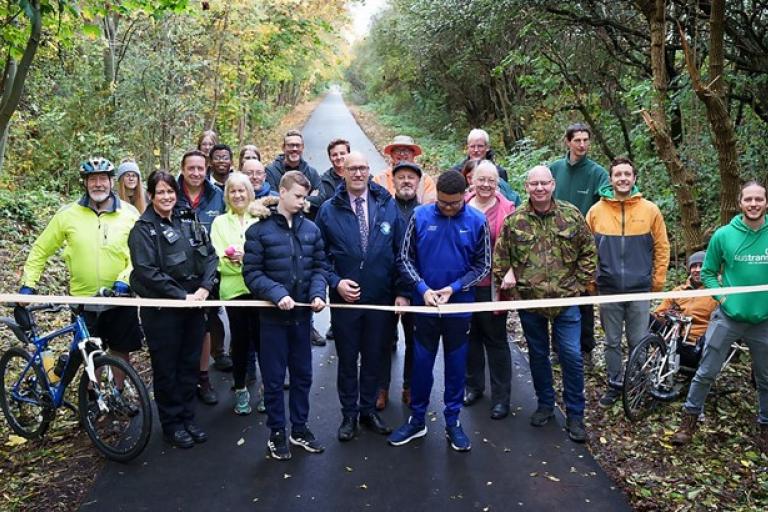
“You can’t even build a home extension without financial certainty”: Active travel charity Sustrans facing “substantial” job losses, as budget slashed by a third following government funding cuts
Walking and cycling charity Sustrans could be set for “substantial” staffing cuts, after its budget was slashed by a third following government funding cuts and amid uncertainty over its financial future.
While the new Labour government pledged £100m for active travel in the recent Budget, this only extends Sustrans’ funding for one more year, and it’s currently unclear how much of the £100m – if anything – will go to the charity.
However, Xavier Brice, the CEO of Sustrans – which runs the National Cycle Network (NCN) – described the situation as a “challenge rather than an existential threat”, insisting that its new strategy will focus on delivering more improvements to the NCN.
Nevertheless, speaking to road.cc alumnus Laura Laker for Cycling Industry News, Brice also noted that the network is a “major piece of infrastructure” that needs long-term public investment to bring it up to scratch.
“Funding is going to be really tight, and in the foreseeable future, Sustrans is going to shrink. This is just the fiscal reality of where we are,” he told Laker.
“We have governments committed to active travel in the UK but the budget last year was around £150m, and some of that was a backlog from previous years. Already this year we are looking at that being closer to £100m. That means less income to pay for people in the near term to do the work.”
Brice also pointed to a “lag on the consequences of active travel funding cuts” made by the Conservative government in 2023, as money for infrastructure takes time to spend, saying cuts in England “really start to catch up with you”.
This issue is compounded by Transport Scotland’s recent decision to bring cycle infrastructure delivery in-house. This year, £93m of Sustrans’ £146.4m funding came from Transport Scotland under its “permanent infrastructure fund”, Places for Everyone, a significant chunk that will now be lost following the handover.
“The real pressure is that long-term multi-year funding: it’s really hard to build infrastructure with a year’s certainty, and a bit of carry over,” Brice said.
“It would be hard to build a significant home extension if you only had financial certainty for a year, so how can you upgrade and improve an active travel network?”
26 November 2024, 15:27
Super-light new bike alert! And it’s a throwback to the glory years of the late noughties, too
Ladies and gentlemen, for our latest flyweight bike bout…
> Scott unveils new 5.9kg Addict RC road bike... the same weight as the 2008 version
26 November 2024, 11:56

“I thought I’d regret it for the rest of my life if I didn’t give it a crack”: Olympic silver medal-winning sprinter Matt Richardson says “GB has always been something that’s stuck with me” following defection from Australia and life-time ban
Great Britain’s newest track star Matt Richardson says he would have “regretted it for the rest of my life” if he hadn’t made the switch from Australia following his triple medal-winning campaign at the Paris Olympics – a move that this week saw him banned from representing the Australian team for life.
Yesterday, we reported on the live blog that a review by AusCycling found that Richardson’s defection to GB – which was kept secret from his fellow riders and staff before the Paris Games – conflicted with the “values of the Australian National Team and the broader cycling community”.
The review also revealed that Richardson had attempted to take his Australian team bike and kit to Britain following the Olympics, but before he publicly announced his decision, a move AusCycling deemed an “unacceptable risk” to the squad’s intellectual property.
(Zac Williams/SWpix.com)
While the governing body concluded that its initial attempts to ban Richardson from all competition for two years were “legally unenforceable”, AusCycling did however stipulate that the double silver medal-winning sprinter will “not be eligible to rejoin the Australian Cycling Team at any point in the future”.
Nevertheless, the 25-year-old – who kicked off his new career in British colours be beating his Olympic nemesis Harrie Lavreysen in the sprint and keirin in the UCI Track Champions League in Paris on Saturday – is adamant that his move halfway across the world is the right one.
“GB has always been something that’s kind of stuck with me since I was a kid,” Richardson, who was born in Kent and moved to Australia at the age of nine, said in an interview with SBS at the weekend.
“Since I moved out to Australia and then when I started racing for Australia, it was always kind of a thought in my mind that I could actually be racing for GB, so it kind of stuck with me since then.”
He continued: “Kind of midway through my career now, I figured now is probably a good time to do it, if I was going to do it.
“And I just kind of thought I’d regret it for the rest of my life if I didn’t give it a crack and try and make the swap. So here I am.”
Reflecting on the perks of living in Britain to compete in what remains a very Euro-centric sport, he said: “Coming here [to Paris] was only an hour's flight. Super chill, rather than coming from Australia, it takes two days or something like that.
“It’s already kind of reaping the rewards from that sense. And it’s nice being close to the racing.
“The move has come with its challenges of course, trying to settle into a new environment and a new team and things like that, but it’s gone pretty smoothly I’d say.”
26 November 2024, 12:56
Man left with container full of 500 salvaged bikes after environment chiefs blocked attempt to send them to charity in Africa
A Perthshire man who attempted to send 500 bikes to a charity in Africa has criticised the “ludicrous” and “arbitrary” decision made by environment chiefs to block the shipment, on the grounds that the condition of many of the bikes meant that they were considered waste.
According to a waste manager at the Scottish Environment Protection Agency (SEPA), the organisation had a duty of care to prevent Scotland’s waste simply being dumped in another country.
64-year-old Nigel Carter had been collecting bikes from across Scotland to be shipped to Sudan, to help provide access to cheap transport in the war-torn country.
Carter told BBC Scotland that he had gathered the bikes from Scottish recycling centres to offer to local charities, with those not taken set to be given to a charity in Sudan.
The ongoing civil war in the African country has led to a lack of oil and fuel, increasing demand for bikes.
Carter then shipped the roughly 500 bikes in a container to a Scottish port, where they were stopped for inspection by environment officials and ultimately sent back to the 64-year-old – after SEPA concluded that some of the bikes needed repairs before they could be used and were currently unfit for purpose, and therefore considered waste.
In a statement, SEPA told the BBC that they had contacted Carter about the necessary repairs before shipment and were disappointed in their condition by the time when they arrived. The agency also claimed that they were not confident that the bikes would be reused for transport in Sudan.
However, Carter says it was “ludicrous” that the container had not met shipping requirements, noting that he did not think there was a set standard that the bikes were marked against and claimed the inspector’s decision was arbitrary.
“It’s as whimsical as if someone were to have a bad day, they could refuse the container,” he said, accusing the officials of “box-ticking bureaucracy”.
However, he admitted that he knew some of the bikes would need work when they arrived in Sudan, but says he did not understand what else they would have been used for.
Carter also argued that the necessary repairs were only minor and could easily be fixed, such as rusty oil and frames, and broken brake cables, and said that these repairs would be more cost-effective if they were carried out in Sudan, rather than Scotland.
The bikes were approved by qualified mechanics and deemed acceptable by the charity set to receive them, he added, noting they would have been used by children to get to school or to help people run their businesses.
Carter also said that it was costing the Sudanese charity for the shipping container to be sitting in “limbo”, putting them at risk of closing.
As for the salvaged bikes themselves, Carter said they will now most likely be scrapped or taken back to their recycling centre of origin.
26 November 2024, 13:41
“This was a horrific incident and shocking for those who witnessed it”
26 November 2024, 10:57
Wout’s back on the bergs!
He may have had a horribly frustrating, injury-ravaged 2024, but at least Wout van Aert is back where he belongs: on his bike, with his Visma-Lease a Bike teammates, and riding on the cobbled bergs and wet, windy roads of the Belgian classics.
Van Aert was out yesterday with his Visma colleagues, including newly signed U23 world champion Niklas Behrens, for a 97km route starting and finishing in Oudenaarde, the Tour of Flanders’ finish town, and taking in quite a few of the Flemish monument’s most iconic climbs, including the Oude Kwaremont, Paterberg, Wolvenberg, Molenberg, and Valkenberg.
The Belgian star also passed the spot where he crashed on the run-in to the Kanarieberg at this year’s Dwars door Vlaanderen, breaking his collarbone and ribs and ruling him out for two months, forcing him to miss both the Tour of Flanders and Paris-Roubaix.
> Is Wout’s Ronde dream over? Disastrous crash takes out Flanders favourite Van Aert
Alongside Van Aert and Instagram film-maker Behrens on their pre-Christmas Ronde recon were fellow big names Olav Kooij, Christophe Laporte, Edoardo Affini, and Dylan van Baarle, as well as 19-year-old British hopeful and Baby Giro stage winner Matthew Brennan, who’s stepping up from Visma’s development team to the World Tour squad in January.
I swear, these classics training camps are getting earlier every year. Whatever happened to a few gentle weeks spinning the legs in Mallorca?
26 November 2024, 11:36
Speaking of things happening earlier each year – it’s the first leaked kit reveal of the 2025 season!
And true to their chaotic, dysfunctional form, it just had to be Movistar:
First accidental 2025 jersey reveal of the off-season
— Mathew Mitchell (@procyclinguk.com) November 25, 2024 at 8:36 PM
Looks like the UCI’s clampdown on team kits resembling race leader’s jerseys is going well, thanks to Movistar’s apparent homage to the Tour’s white young rider’s jersey, as styled by Remco Evenepoel this year:
(Charly Lopez/ASO)
Oops.
Oh, it’s going to be a long two months until the evening before the Tour Down Under, when EF and Rapha post their ninth teaser clip of the winter, featuring moody lighting and flashes of pink, before finally unveiling a kit with a touch more yellow on the sleeves than this year’s jersey.
It’s the most wonderful time of the year…
26 November 2024, 12:36
Professional cycling, where there are more leaks than a Welsh allotment
Blimey, it must be ‘Unofficial 2025 pro team kit leak day’ (or maybe something a bit catchier), as Groupama-FDJ become the latest squad to casually air their new threads on social media… while starting the most frustrating game of Spot the Difference ever:
For the 3rd season in a row, one of the classiest jerseys in the peloton (just a Groupama logo change for 2025) 📷Eddy Lequartier
— Dan Deakins (@dandeakins.bsky.social) November 26, 2024 at 11:29 AM
(Spoiler: Groupama’s ‘G’ logo has changed. And that’s about it. Good work design team! Hey, if it ain’t broke, don’t fix it, and all that.)
26 November 2024, 10:44
Wiggle administrator reveals beleaguered cycling retailer made £10.4m profit during administration
Wiggle generated more than £41.7m in sales since the cycling retail giant entered administration last October, the administrator revealing that this resulted in a profit of £10.4 million.
Read more: > Wiggle administrator reveals beleaguered cycling retailer made £10.4m profit during administration
After obtaining a PhD, lecturing, and hosting a history podcast at Queen’s University Belfast, Ryan joined road.cc in December 2021 and since then has kept the site’s readers and listeners informed and enthralled (well at least occasionally) on news, the live blog, and the road.cc Podcast. After boarding a wrong bus at the world championships and ruining a good pair of jeans at the cyclocross, he now serves as road.cc’s senior news writer. Before his foray into cycling journalism, he wallowed in the equally pitiless world of academia, where he wrote a book about Victorian politics and droned on about cycling and bikes to classes of bored students (while taking every chance he could get to talk about cycling in print or on the radio). He can be found riding his bike very slowly around the narrow, scenic country lanes of Co. Down.
Latest Comments
- David9694 20 min 56 sec ago
That's a clear 2 points awarded there, but I guess as there's now a 25% tariff you'll only get 1.5
- mark1a 31 min 56 sec ago
Fawkes Cycles is only local if you live near Oldham. That's nearly 300 miles away from me. Also, any retailer that doesn't participate in an...
- David9694 34 min 7 sec ago
Openreach under fire over delays to Amesbury cabinet repairs...
- brooksby 36 min 14 sec ago
Out of curiosity, what options do you have if you get - say - halfway along there and then find that it is closed due to incompetent civil...
- Rome73 1 hour 56 min ago
'He’s more upset about not currently having a car.” obvioulsy.
- Destroyer666 8 hours 31 min ago
Anodizing the aluminium is also for corrosion resistance and therefore enhances the longevity of the rims while this is not really a case for...
- bobbinogs 9 hours 45 min ago
Wheelsmith has always been very good for me. Malcolm was always very opinionated so I got bored with him telling me I should be riding tubeless,...
- Terry Hutt 10 hours 4 min ago
I assume you can carry an e-bike battery on the tube if you leave the bike at home. ...
- chrisonabike 11 hours 6 min ago
I love it - it's a roundabout with a sculpture of a roundabout on its desk!
- Rendel Harris 11 hours 14 min ago
To rhyme with design. I wondered this myself so looked it up a while ago, according to the founder Micki Kozuschek he and his team had a few...


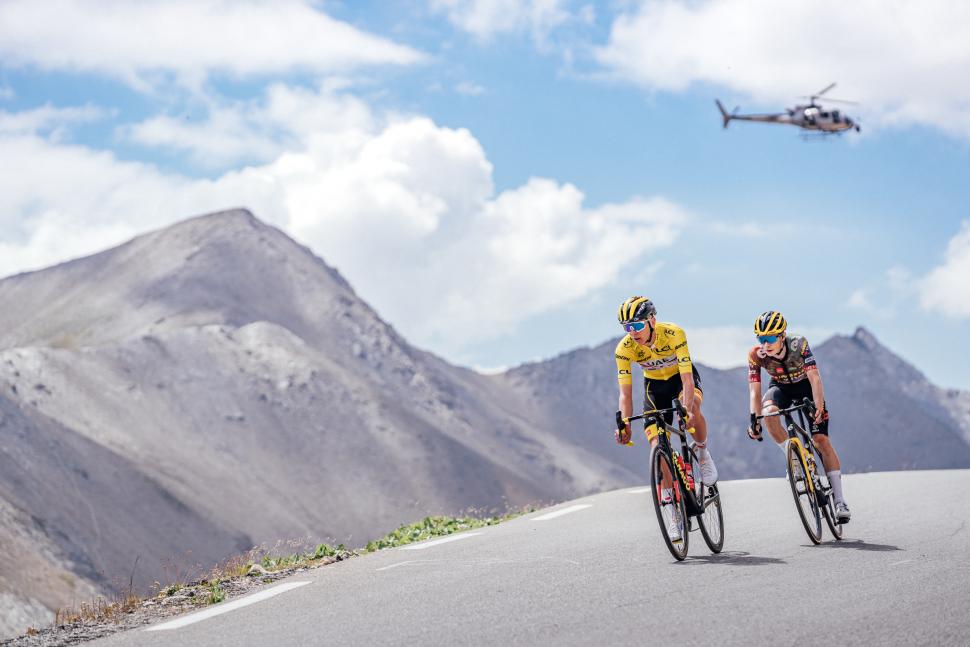
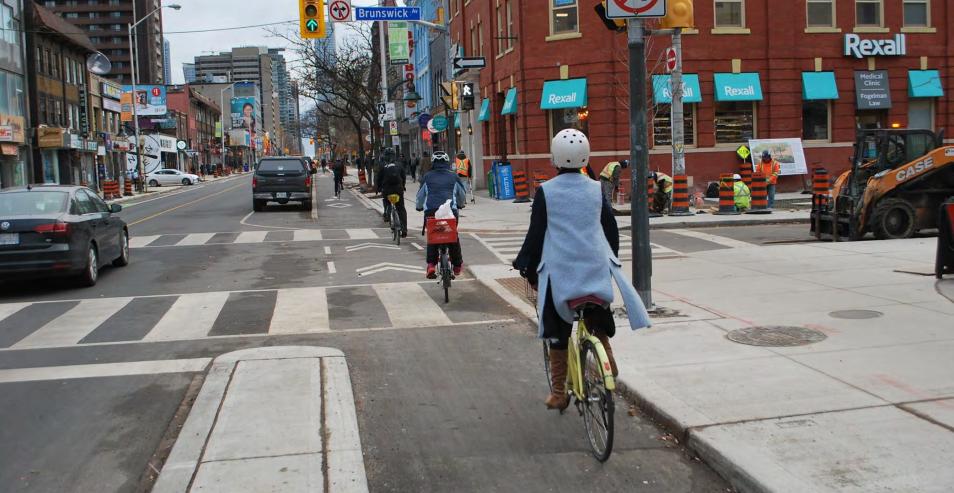
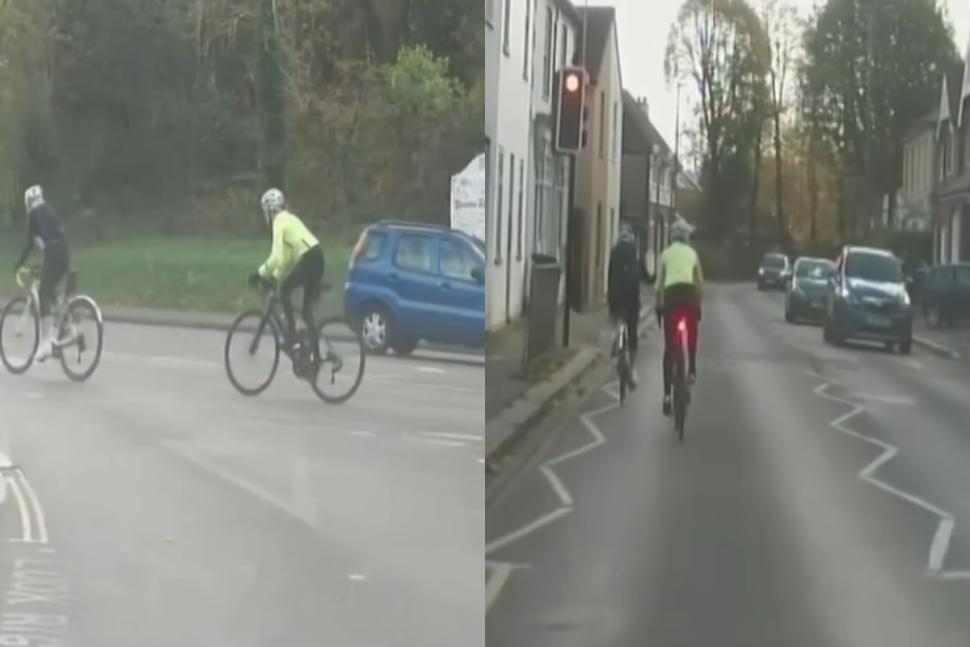
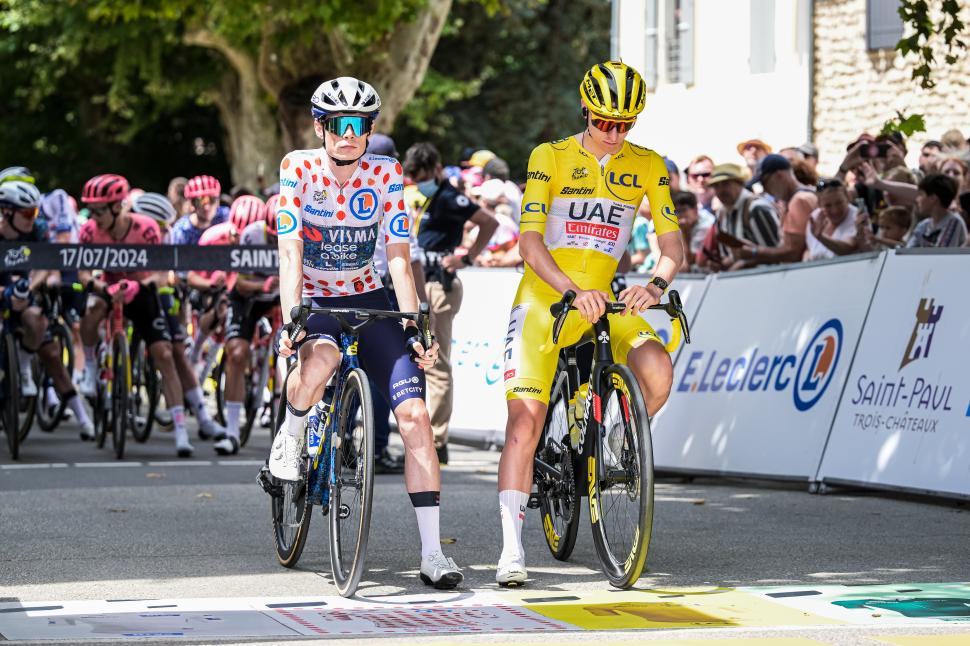

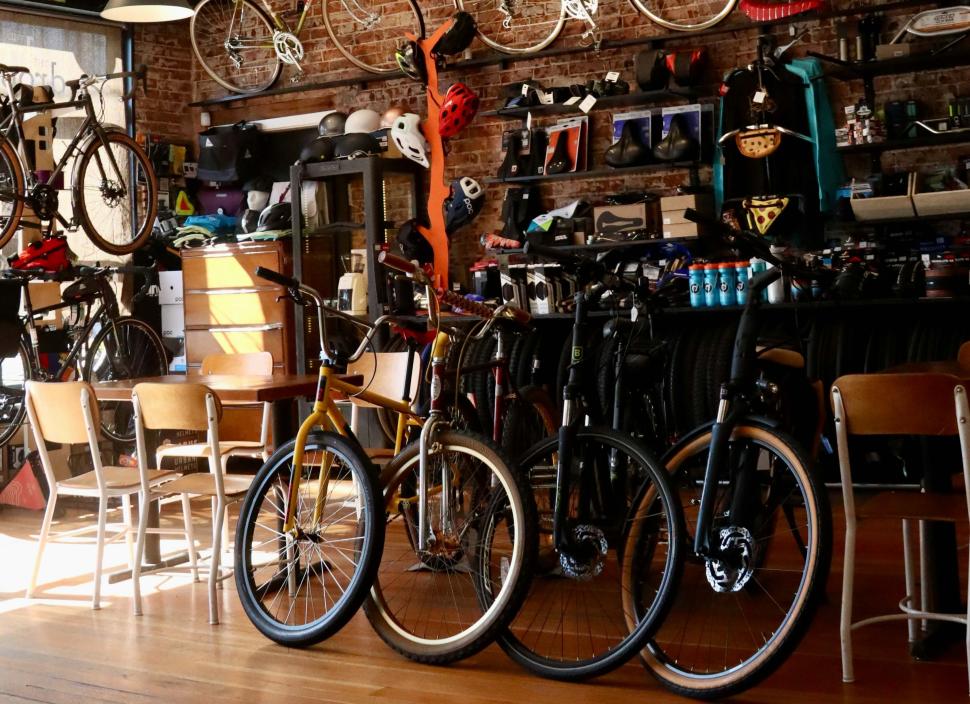
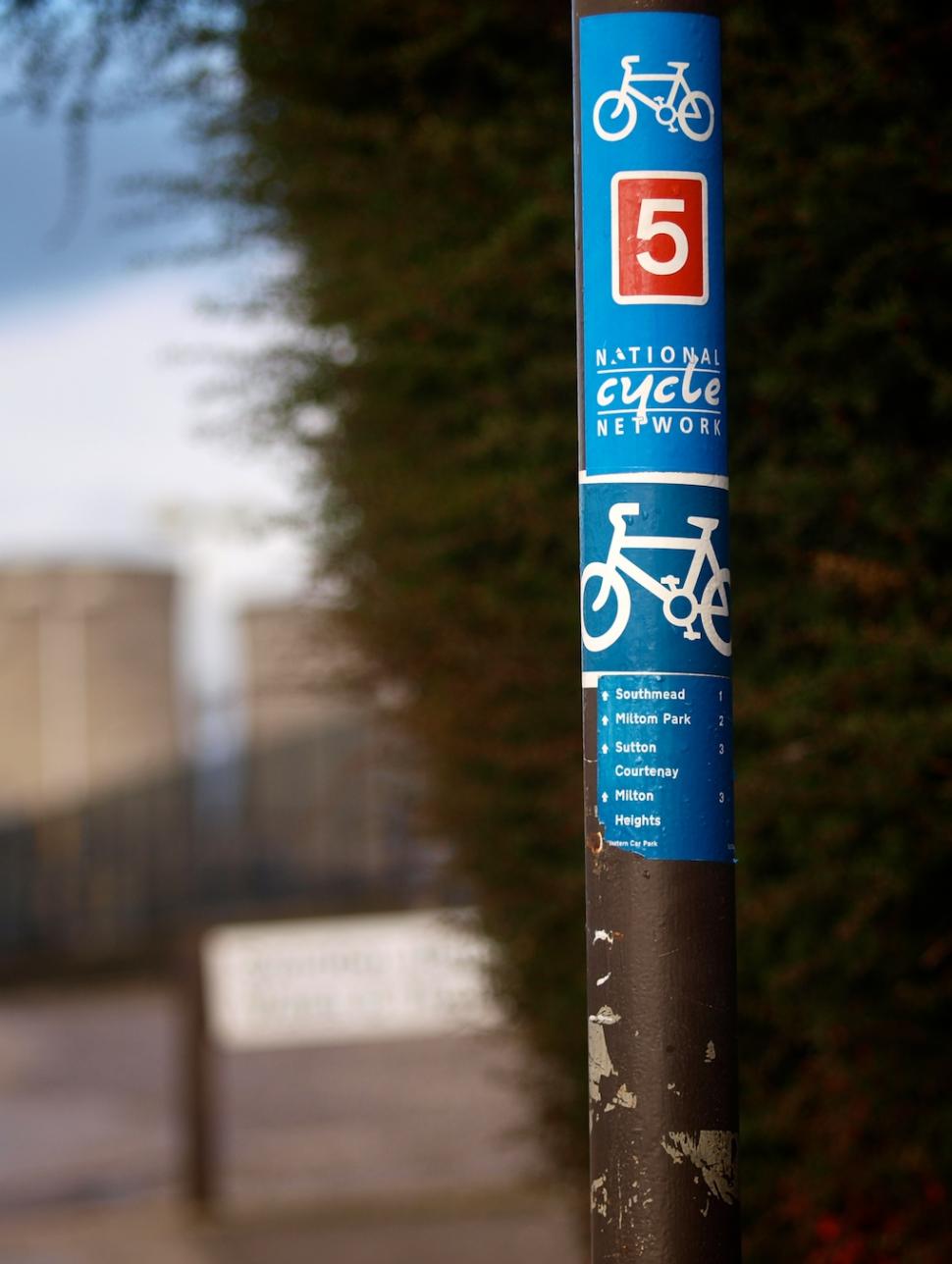


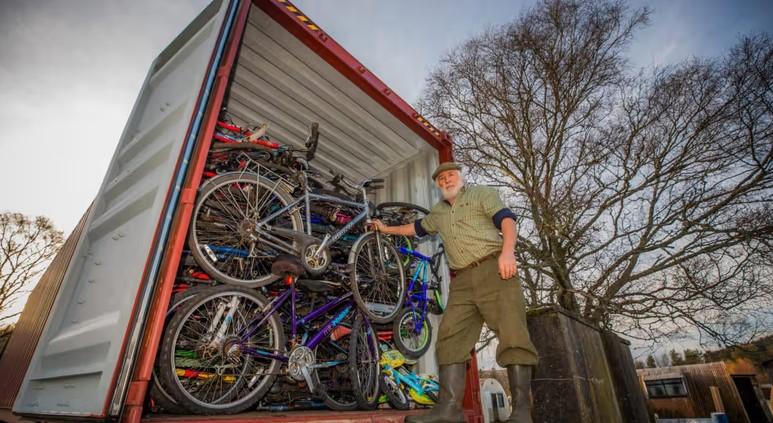


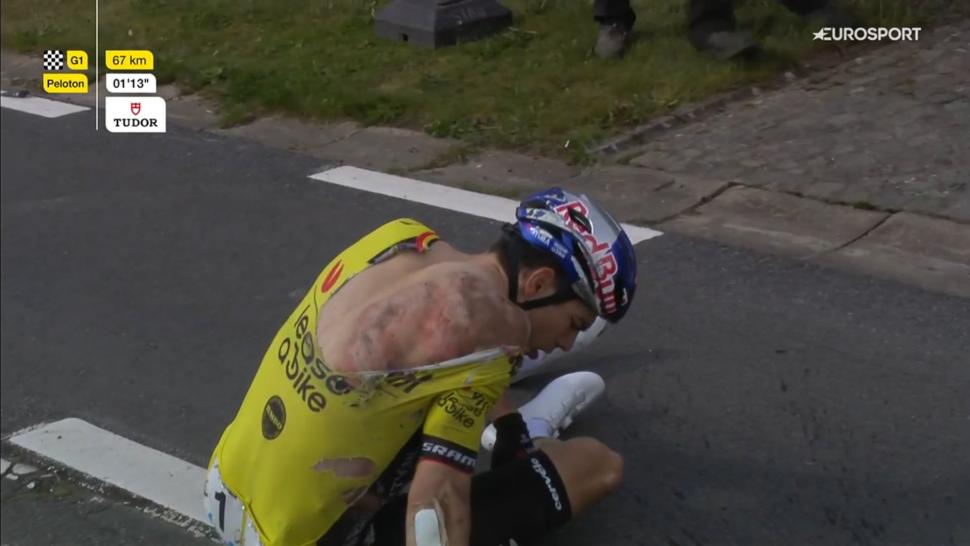
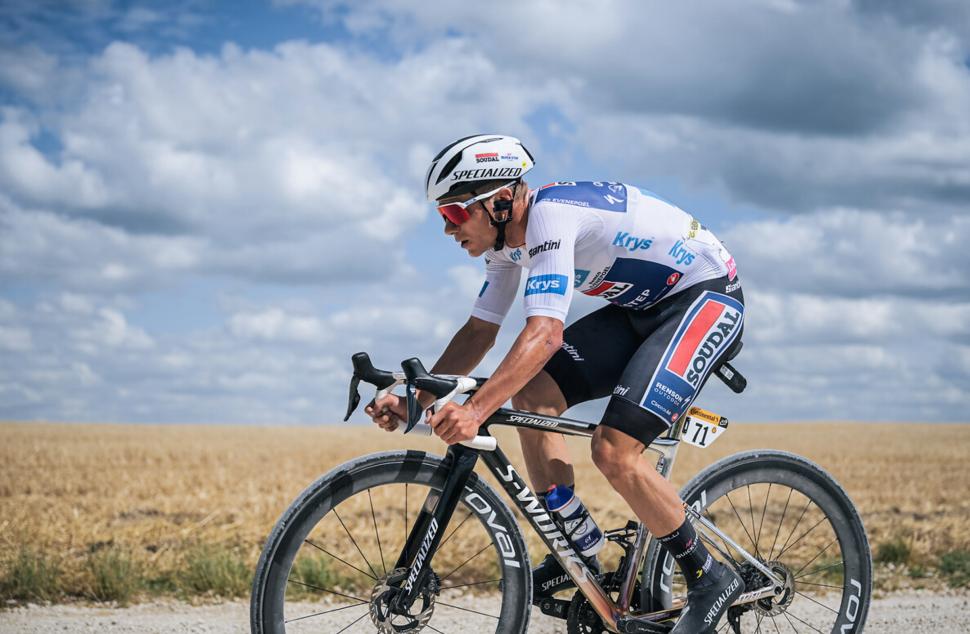

Add new comment
20 comments
Prudhomme is the worst thing in pro cycling - even worse than the green washing and red washing.
Without knowing him personally, all I can say is that I have a bad feeling about him - and it's not much better with David Lappartient...
TfL to fine firms whose electric bikes block pavements
https://www.theguardian.com/uk-news/2024/nov/26/tfl-fine-electric-bikes-...
£100 million nationwide really doesn't really seem like a lot of money, does it…?
Also Labour government:
Fixing pot holes is also popular with cyclists because we're disproportionally affected by them, and generally there aren't cycle route networks in the UK (few exceptions possibly parts of London, Cambridge ...) where you can avoid constantly-trashed main roads or irregularly maintained "quiet streets".
BUT ... that's basically 5 times what we're doing for active travel poured into holes in the ground. And through the UK's poor management of utilities works (plus shoddy water companies) and heavy motor traffic (both senses) we're going to be pouring a similar amount into holes the ground again very soon...
Hear me out on this: whilst I do have every sympathy for people losing their jobs, less funding for Sustrans is not necessarily a bad thing. Given that they have, in my view, set cycling back by signing off on any old rubbish in exchange for a blue Notional Cycle Network sign, a decline in their influence might be a good thing. So long as the money is spent on actual, high quality infrastructure, not Sustrans standard nonsense.
Yep. We've got a network now. Next stop: let's make it fit for purpose.
Not sure that so much of the network delivered by Sustrans is the network we need for "mass cycling" * . The one we need for that goes where all the cars do now. It will also need to tackle the junctions - at least until we get nearer to where NL is and can "untangle" routes and start thinking in terms of separate networks for e.g. cycling and driving (see Hoofdnet eg. Fietsersbond article in translation here).
* Not Sustrans' fault there - they could only really do things with the "unused spaces". We still need that more "recreational" cycling network (or an improved version of it) too!
Agree that there is many substandard cycling facilities but I'd be pointing the finger at the Councils that Sustrans has to work with and around to deliver what are often poor compromises dictated by local politicians who frequently ignore the input of council officers as well...reducing input from Sustrans isn't going to improve standards
It's a shame that the name Sustrans is now associated with abysmal cycling routes that are often unusable in certain weathers or just dump you out on a road for part of the route.
To be fair, the whole idea of relying on a charity to build essential infrastructure for the future of the UK is laughable.
Also don't forget - Sustrans are a charity *.
We have entirely the wrong attitude about active travel provision: it doesn't seem to be viewed as "transport". Or if so then certainly not very important. It's "nice to have" / "recreational" / "OK, I guess we have to do something for people who can't drive / afford a car" / "we need to move the pedestrians out of the way so people can drive efficiently".
(I have mixed feelings about Sustrans also... have learned some more about the early days at least from Laura Laker's excellent book on the NCN though).
* It sometimes seems that charities actually keep the UK working: lots of really critical work is actually done by them. There's the RNLI, mountain rescue teams, lots of active travel stuff, many social and medical support organisations ... And this of course ignores the fact that most work caring for people is unpaid or so poorly paid it's virtually charitable.
Was Van Aert really recon-ing the Ronde, or attempting a half-arsed Strava art elephant?
On the basis that 'they give us all a bad name'...
...I'd like to apologise on behalf of Fords everywhere.
Does that include Rufford Ford (double ford)?
... apparently to be closed to motor traffic because ... people do stupid stuff and publicity makes it worse apparently. The chap who feels he precipitated this does at least put his hands up:
Of course this kind of stuff is entirely to be expected from humans where mass motoring exists. The con is we don't factor this in sufficiently wherever we provide for motor traffic (especially in the UK, other countries may have a better grasp of "human factors").
Disk brakes are more powerful and allow to brake later, so take more risks, eg more compact groups at high speed. I had my 1st ever skid of the front wheel with disk brakes, in an emergency situation. We might see ABS on bikes at some point.
Earpieces might cause a vey slight deficit in perception, balance and hearing, since ears are where the vestibular system is located... (in addition to the stress caused by instructions given by the teams).
That said I can't give any advice about this, and I never took part in competitions anyway...
But if a scare last night in the car in an nsl. Thought I could suddenly see a bike ahead with a cyclist in black, no lights, just a tiny reflector. "Where did he come from?".
As I braked, it then became apparent that the red reflector was in fact the rear light of a car ahead reflected in a large puddle !
At the Worlds support riders are not under pressure to finish in a high position to gain points for the teams trying to avoid relegation and a substantial part of the race is nearly always on a circuit so it's easier to ensure good road conditions and effective safety barriers. The argument that riders are causing crashes by trying to move up to the front because they've been ordered to do so over the radio might have some truth in it but how many crashes are caused in races without radios by riders having to skip around the peleton trying to find their leader to get instructions, dropping back to the cars to get instructions then having to get back to the front to pass them on and so on? I would guess that one of the biggest causes of crashes is rider fatigue, but I don't see the UCI putting in many controls on GTs and other races trying to outdo each other trying to find more and more vicious climbs each year.
#MakeRacingSlowAgain
https://www.youtube.com/watch?v=CB9lf9BqgmQ
Don't forget the hour record!
https://www.cyclingnews.com/news/formolo-sperotto-set-novelty-slowest-ho...
(Apologies I think road.cc reported this also but can't find link).
I nearly won one of these competitions at the Tour de Fat in Chicago. I was about five feet from the finish, and thought there was one other rider behind me. I turned to see how far back they were, and there was nobody there, but I ended up putting a foot down. I could have sprinted from where I was, and still won.